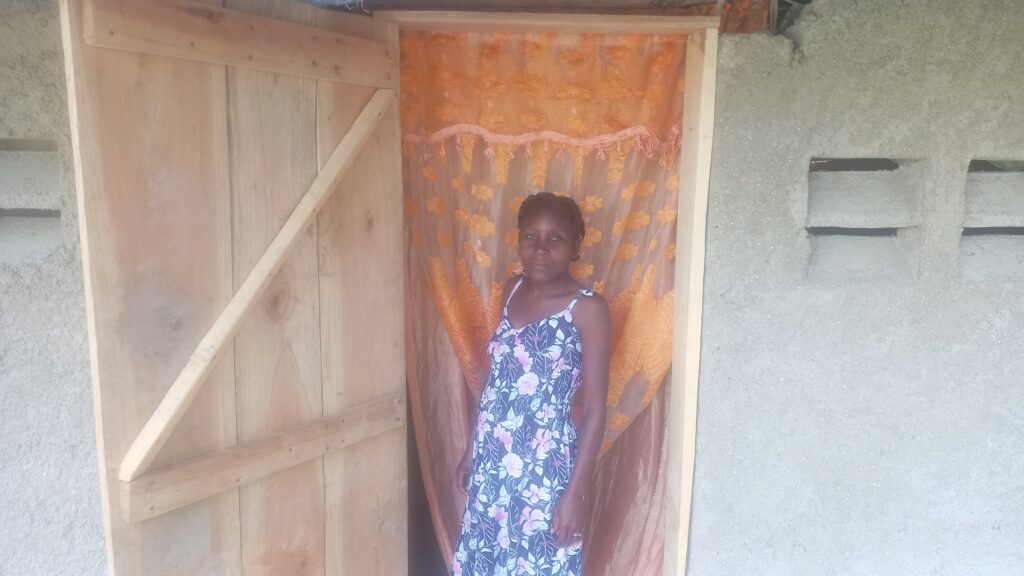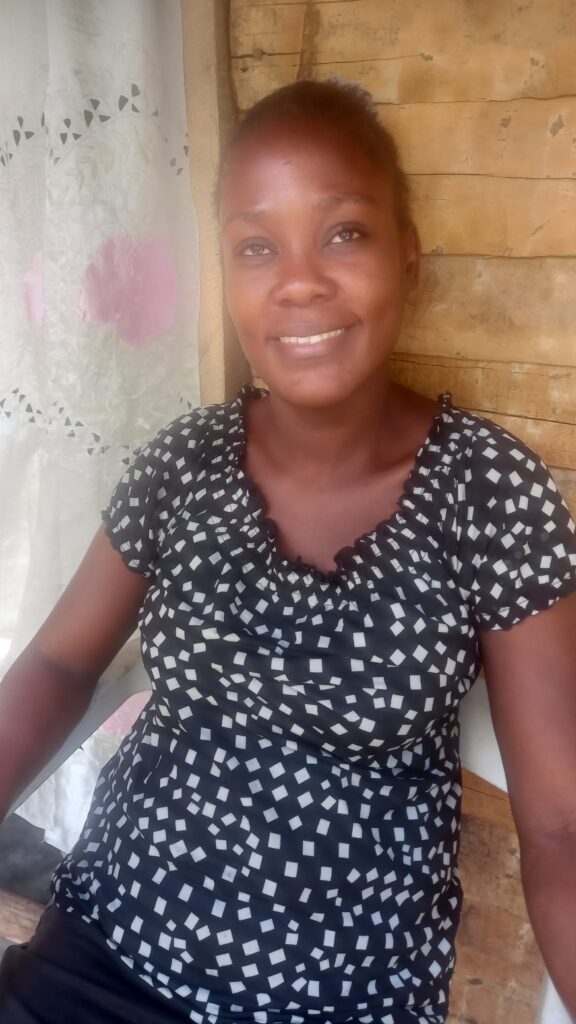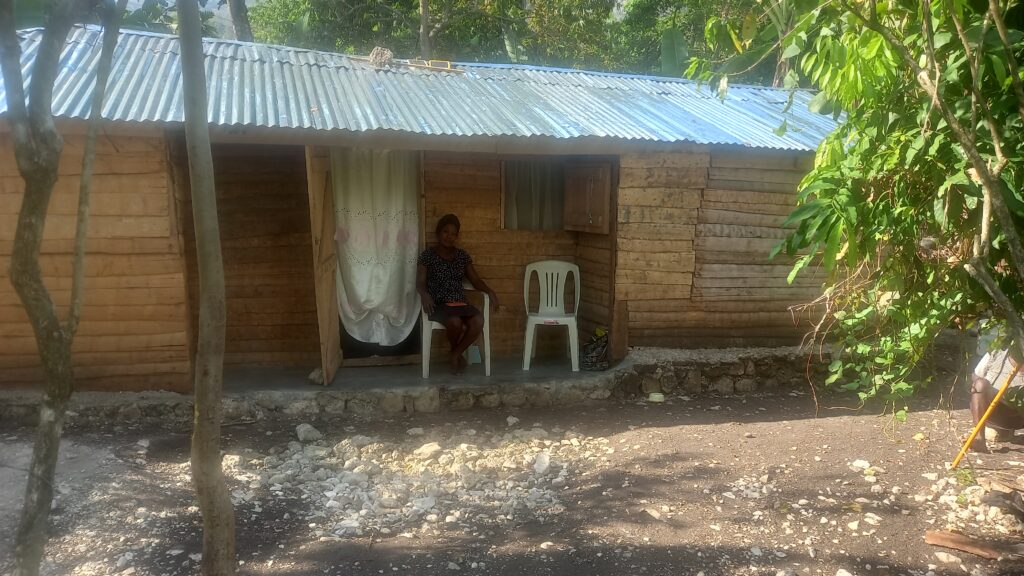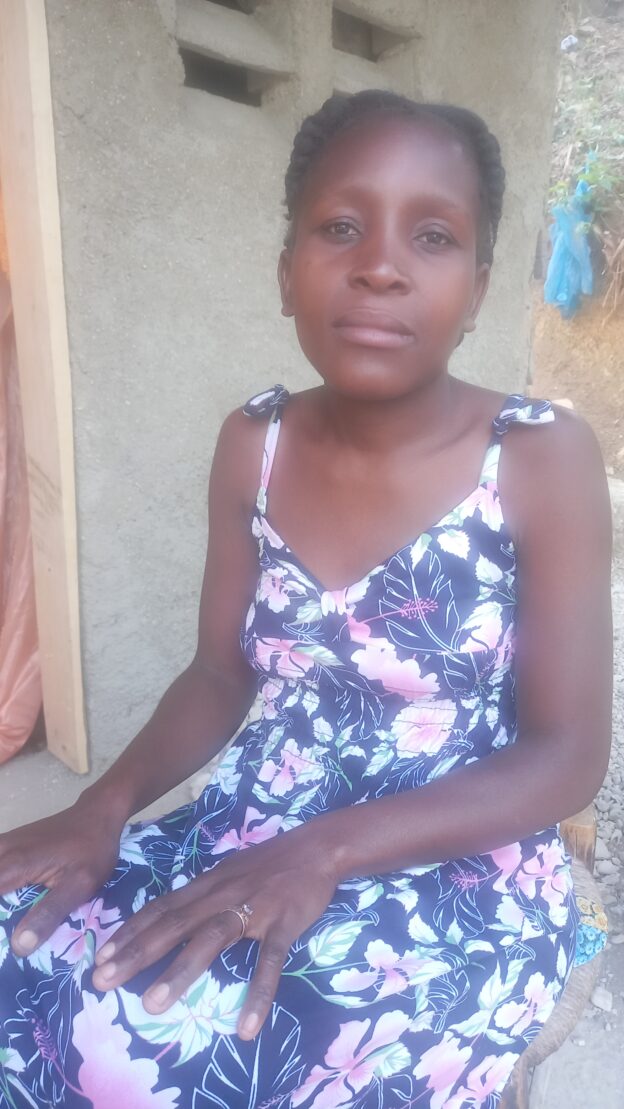Germanie Antoine lives just off the road that leads from Savanèt eastward towards the Dominican border. When she and her husband, Jeangard, joined the program, they were just getting by. The family of four lived in a single small room that they rented. Its roof was no good. The family and everything they owned would be soaked by every rain.
Things were a little better during the annual avocado season. She had neighbors willing to sell her their harvest on credit. “They knew me and they knew my father. If I didn’t pay them, they knew where to go.” She’d haul the avocados away for sale down the dirt road that passes through her neighborhood, at the Dominican border, and then return home to pay what she owed.
But the rest of the year, she, Jeangard, and their two young children lived mainly off whatever he could earn as a day-laborer, helping skilled construction workers by mixing or hauling cement. “I had nothing. No livestock. I didn’t have a chicken. I didn’t have even a single chicken feather to clean out my ears.”
When she joined the CLM program, she asked for goats and small commerce, but she did not make much progress with her goat. The program gave her one, and it had a first litter of two, a buck and a doe. When it was time to register her boys for school, she sold the buck to pay their tuition. The young doe was stolen shortly after that. The first goat became pregnant again, but died suddenly, just before it should have given birth.
Her case manager encouraged her to think about the small commerce she’d like to establish, and they came up with a plan. “You could have a suitcase of money at home and not know what to do with it. The CLM team gives you advice. Even if you have nothing, they can help you succeed.”
The business model they came up with was straightforward. Germanie would buy groceries on Thursdays at the large market in downtown Savanèt. “I put them on display at the market, and sell what I can there. I bring home whatever’s left, and sell it from my house the rest of the week.”
She started with the money that the team transferred to her for small commerce, but she soon added to the business with credit from her savings and loan association. She now has about 20,000 gourds in the business. “I cannot buy for all that money every week, but, when I am short, people sell me the rest on credit. They know I can pay.”
The business took off. It helped her manage her household expenses, and did much more. She repaid the loan easily. She used her income to make weekly contributions to a sòl, a traditional Haitian savings club, and to her association as well. She bought another goat, which has already produced offspring twice, three small goats in total.
When she, her husband, and her case manager saw that her husband was not getting any work, they came up with a plan for him as well. They took proceeds from her business so that he could start a business of his own. He buys Dominican plantains at the border, and he brings them back for sale to Savanèt. His customers are mainly wholesalers, who bring them for sale to Mibalè.
With them both now bringing in steady income, they have been able to accomplish a lot. First, they bought a very small parcel of land close to the room they had been renting. Then, they managed all they they had to do to build a home on it. By this time, each had family in the DR, and they got help from her brother and others who were anxious to know that they had moved into their own home.

And their income is growing. When her turn came to receive the money from her sòl, Germanie added to it with a new loan from her savings and loan association, and the couple bought a used motorcycle. They rent it to a taxi driver, who pays them a fixed sum every week.

Johanna Josue joined the CLM program as part of the same group that Germanie was part of. The two women are just about a month from graduating.
Johanna and her husband had been living in the Dominican Republic with their sons, but she had no legal status, so she was always at risk. She and her husband decided she’d return to Savanèt with their boys. He sent money for her to rent an apartment, but he found another woman shortly after that and then stopped sending support Johanna and the children. When Johanna no longer heard from him at all, she asked folks whom they new back in the DR, and she heard that he had moved on to Brazil.
Initially, Johanna struggled. She supported the boys as best she could as a day laborer. She would look for work in her neighbors’ fields or doing someone’s laundry. For the most part, she was able to keep them fed. When she joined the program, she reported that they occasionally went a day or more without a meal, but only rarely. But she could send just one of her three boys to school. She didn’t have the money to send the other two.
Like Germanie, Johanna asked her case manager to provide goats and small commerce. She, however, took two goats, rather than one, and left less of her transfer for commerce. But shortly after one of the goats had its first offspring, thieves took all three.
Like Germanie, however, her small commerce is what has really helped her succeed. She tried several businesses — school supplies, laundry soap, cosmetics — looking for what worked best. She eventually found a body lotion that sells very well. She buys it in large quantities in Laskawobas, then brings it home for sale. Most days, she sells it from a small stand on the side of the road, but on Saturdays she walks around the area, selling it from a basket she carries on her head. “It sells much better when I walk around with it.”
Her business model is odd. She travels to Lascawobas only every couple of months and buys her merchandise. It then takes her two months to sell out. She would like to have a commerce that turns over more quickly, but, she says, “you have to do what you’re comfortable with.”
She earns enough to manage her household expenses, to buy shares each week in her savings and loan association, and to contribute to her sòl. She contributes 2,500 gourds to the latter every week. The sòl is important. She uses its pay-out to buy the merchandise, so as long as she contributes consistently, she can spend the rest of what she earns.
Like Germanie, Johanna too needed a place to live. Thanks to conversations between her, her case manager, and a member of the committee of leaders who support the program in her neighborhood, she had the chance to buy a small piece of land. The committee member was willing to sell it for just 75,000 gourds, and he and his wife agreed that Johanna could build on it and then move in right away, rather than having to wait until she finished paying. Johanna’s sister lives in the Dominican Republic. She saw that Johanna had managed to build a small house that she shares not only with her boys, but with the two women’s mother, too. She paid Johanna to add another room to the home that she can stay in during her occasional visits. Johanna eventually added a third room herself, too.

Johanna wants to do more. She has been accumulating livestock. The program helped her replace the goats that were stolen with two more. One of these has had a kid, and the other is pregnant. She has also been purchasing poultry. Eventually, she would like to build a room out of block to add to her new home.
